#tech unions
Text
Tech workers and gig workers need each other
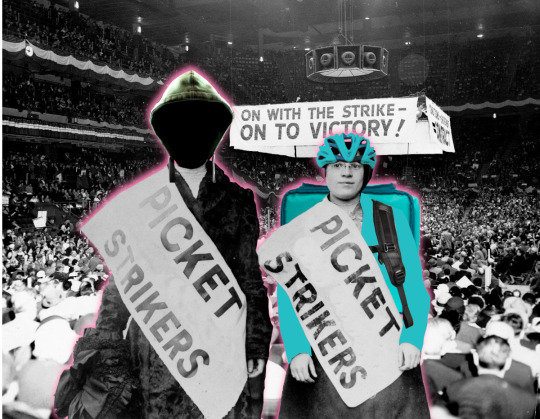
Catch me in Miami! I'll be at Books and Books in Coral Gables on Jan 22 at 8PM.

We're living in the enshittocene, in which the forces of enshittification are turning everything from our cars to our streaming services to our dishwashers into thoroughly enshittifified piles of shit. Call it the Great Enshittening:
https://pluralistic.net/2023/11/09/lead-me-not-into-temptation/#chamberlain
How did we arrive at this juncture? Is it the end of the zero rate interest policy? Was it that the companies that formerly made useful things that we valued underwent a change in leadership that drove them to make things worse? Is Mercury in retrograde?
None of the above. There have been many junctures in which investors demanded higher returns from firms but were not able to force them to dramatically worsen their products. Moreover, the leaders now presiding over the rapid unscheduled disassembly of once-useful products are the same people who oversaw their golden age. As to Mercury? Well, I'm a Cancer, and as everyone knows, Cancers don't believe in astrology.
The Great Enshittening isn't precipitated by a change in how greedy and callous corporate leaders are. Rather, the change is in what those greedy, callous corporate leaders can get away with.
Capitalists hate capitalism. For a corporate executive, the fact that you have to make good things, please your customers, pay your workers, and beat the competition are all bugs, not features. The best business is one in which people simply pay you money without your having to do anything or worry that someday they'll stop. UBI for the investor class, in other words.
Douglas Rushkoff calls this "going meta." Don't sell things, provide a platform where people sell things. Don't provide a platform, invest in the platform. Don't invest in the platform, buy options on the platform. Don't buy options, buy derivatives of options.
A more precise analysis comes from economist Yanis Varoufakis, who calls this technofeudalism. Varoufakis draws our attention to the distinction between profits and rents. Profit is the income a capitalist receives from mobilizing workers to do something productive and then skimming off the surplus created by their labor.
By contrast, rent is income a feudalist derives from simply owning something that a capitalist or a worker needs in order to be productive. The entrepreneur who opens a coffee shop earns profits by creaming off the surplus value created by the baristas. The rentier who owns the building the coffee shop rents gets money simply for owning the building.
The coffee shop owner can never rest. At any moment, another coffee shop can open down the street and lure away their customers and their baristas. When that happens, the coffee shop goes bust and the owner is ruined. But not the landlord! After the coffee shop goes bust, the landlord's asset is more valuable – an empty storefront just down the street from the hottest coffee shop in town.
Capitalists hate capitalism. Faced with a choice of retaining their workers by paying them a fair wage and treating them well, or by saddling them with noncompetes that make it impossible to work for anyone else in the same field, and obligations to repay tens of thousands of dollars for "training" if they quit, bosses will take the latter every time. Go meta, baby.
Same for competition. Faced with the choice of competing to win the most customers with the best products, or merging so that customers have nowhere else to go, even the bitterest of rivals find it remarkably easy to intermarry until our corporations landscape is so interbred the dominant firms all have Habsburg jaws. Think: Facebook-Instagram. Disney-Fox. Microsoft-Activision:
https://locusmag.com/2021/07/cory-doctorow-tech-monopolies-and-the-insufficient-necessity-of-interoperability/
Enshittification has complex underlying dynamics and a reliable procession of stages, but the effect is quite straightforward: things are enshittified when they become worse for the people who use them and the suppliers who makes them, but nevertheless, the users keep using and the suppliers keep supplying.
There are four forces that stand in the way of enshittification, and as each of these forces grows weaker, enshittification proliferates.
The first and most important of these constraints is competition. Capitalists claim to love competition because it keeps firms sharp: they must constantly find ways to improve products and cut costs or be swept away by a superior alternative. There's a degree of truth here, but that's not the whole story.
For one thing, competition can "improve" things that we would rather see abolished. Critics of the GDPR, the EU's landmark privacy law, often point to the devastation that enforcing privacy law had on the European ad-tech industry, driving small firms out of business. But these firms were the most egregious privacy offenders, because they had the least to lose, lacking the dominant position of US-based Big Tech surveillance companies.
Having the least to lose, they were the most reckless with their privacy invasions – but they were also the least equipped to pay expensive enablers from giant corporate law firms to hold off European enforcers, and so they were obliterated. The resulting lack of competition is fine, as far as privacy goes: we don't want competition in the field of "who is most efficient at violating our human rights":
https://www.eff.org/deeplinks/2021/04/fighting-floc-and-fighting-monopoly-are-fully-compatible
But there's another benefit to competition: disorganization. A sector with hundreds of medium-sized, competing companies is a squabbling mob, incapable of agreeing on the site for an annual meeting. An industry dominated by a handful of firms is a cartel, handily capable of presenting a unified front to policy makers, and their commercial coziness provides them with vast war-chests they can use to suborn governments and capture their regulators:
https://pluralistic.net/2022/06/05/regulatory-capture/
Competition is the first constraint. When there's competition, corporate managers fear that you will respond to enshittification by defecting to a rival, costing them money. They don't care about your satisfaction, but they do care about your money, and competition hitches their ability to satisfy you to their ability to get paid by you.
Competition has been circling the drain for 40 years, as the "consumer welfare" theory of antitrust, hatched by Reagan's court sorcerers at the University of Chicago School of Economics, took hold. This theory insists that monopolies are evidence of "efficiency" – if everyone shops at one store, that's evidence that it's the best store, not evidence that they're cheating.
For 40 years, we've allowed companies to violate antitrust law by merging with major competitors, acquiring fledgling rivals, and using investor cash to sell below cost so that no one else can enter the market. This has produced the inbred industrial hulks of today, with five or fewer firms dominating everything from eyeglasses to banking, sea freight to professional wrestling:
https://www.openmarketsinstitute.org/learn/monopoly-by-the-numbers
The endless and continuous weakening of competition has emboldened corporate enshittifiers, who operate on the logic of Lily Tomlin in her role as an AT&T spokeswoman: "We don't care. We don't have to. We're the phone company":
https://vimeo.com/355556831
But the drawdown of competition has also enabled regulatory capture, by converting cutthroat adversaries to kissing cousins. These companies have convinced their regulators not to enforce privacy, consumer protection or labor laws, provided that the gross violations of these laws are accomplished via apps.
This is where tech exceptionalism is warranted: while the bosses that run these companies aren't any nobler – or more wicked – than the Robber Barons of yore, they are equipped with a digital back-end for their businesses that let them change the rules of the game from moment to moment.
Think of labor law: as Veena Dubal writes, gig-work companies practice algorithmic wage discrimination, turning your paycheck into a slot machine that pays out more when you are more selective about which jobs you take, and which then docks your pay by tiny increments as you become less discriminating about answering the app's call:
https://pluralistic.net/2023/04/12/algorithmic-wage-discrimination/#fishers-of-men
This is a plain violation of labor law, but the fiction that gig workers are contractors, combined with the opacity and speed of the wage discrimination back-end, lets the companies get away with it.
But the monsters who hatched this scam are no worse than their forebears, nor are they any smarter. Any black-hearted coal-boss memorialized in a Tennessee Ernie Ford song would have gladly practiced algorithmic wage discrimination – but there just weren't enough green-eyeshade accountants in the back office to change the payout from second to second.
I call this "twiddling" – turning the knobs on the back end to continuously adjust the business logic that the firm operates on:
https://pluralistic.net/2023/02/19/twiddler/
Twiddling is everywhere, and it is only possible because "it's not a crime if we use an app" has been accepted by (captured) regulators. Think of Amazon's "pricing paradox," where deceptive search results – which Amazon makes $38b/year on – allow the company to offer lower prices, but charge higher ones:
https://pluralistic.net/2023/11/06/attention-rents/#consumer-welfare-queens
The first constraint on enshittification is competition – the fear that you'll lose money when a disgusted customer take their business elsewhere. The second constraint is regulation – the fear that a regulator's punishment will eat up all the expected gains from an enshittificatory move, or even exceed those gains, leading to a net loss.
But the less competition there is in a sector, the easier it is for the remaining companies to capture their regulators. Say goodbye to that second constraint.
But there's another constraint – another one that's unique to technology, and genuinely exceptional. That's self-help. Digital technology is infinitely flexible, which is why managers can twiddle the business logic and change the rules on a dime.
But it's a double-edged sword. Users can twiddle back. The universal nature of digital products means it's always technically possible to disenshittify the enshittified products in your world. Mercedes wants to charge you rent on your accelerator pedal via a monthly subscription? Just mod the car by toggling the "subscription paid" bit and get the accelerator for free:
https://pluralistic.net/2023/07/24/rent-to-pwn/#kitt-is-a-demon
HP tricks you into installing a "security update" that sneakily disables your printer's ability to recognize and use third-party ink? Just roll back the operating system and you won't be forced to spend $10,000/gallon to print out your boarding passes and shopping lists:
https://www.eff.org/deeplinks/2020/11/ink-stained-wretches-battle-soul-digital-freedom-taking-place-inside-your-printer
Self-help – AKA "adversarial interoperability" – isn't just a way to override the greedy choices of corporate sadists. It's a way to hold those sadists in check. It's a constraint.
Imagine a boardroom where someone says, "I calculate that if we make our ads 25% more invasive and obnoxious, we can eke out 2% more in ad-revenue." If you think of a business as a transhuman colony organism that exists to maximize shareholder value, this is a no-brainer.
But now consider the rejoinder: "If we make our ads 25% more obnoxious, then 50% of our users will be motivated to type, 'how do I block ads?' into a search engine. When that happens, we don't merely lose out on the expected 2% of additional revenue – our income from those users falls to zero, forever."
Self-help is the third constraint on enshittification. But when competition fails, and regulatory capture ensues, companies don't just gain the ability to flout the law – they get to wield the law, too.
Tech firms have cultivated a thicket of laws, rules and regulations that make self-help measures very illegal. This thicket is better known as "IP," a term that is best understood as meaning "any policy that lets me control the conduct of my competitors, my customers and my critics":
https://locusmag.com/2020/09/cory-doctorow-ip/
To put an ad-blocker in an app, you have to reverse-engineer it. To do that, you'll have to decrypt and decompile it. That step is a felony under Section 1201 of the DMCA, carrying a five-year prison sentence and a $500,000 fine. Beyond that, ad-blocking an app would give rise to liability under the Computer Fraud and Abuse Act (a law inspired by the movie Wargames!), under "tortious interference" claims, under trademark, copyright and patent.
More than 50% of web users have installed an ad-blocker:
https://doc.searls.com/2023/11/11/how-is-the-worlds-biggest-boycott-doing/
But zero percent of app users have installed an ad-blocker, because they don't exist, because you'd go to prison if you made one. An app is just a web-page wrapped in enough IP to make it a felony to add an ad-blocker to it.
This is why self-help, the third constraint, no longer applies. When a corporate sadist says, "let's make ads 25% more obnoxious to get 2% more revenue," no one says, "if we do that, our users will all install blockers." Instead, the response is, "let's make ads 100% more obnoxious and get an 8% revenue boost!"
https://www.theverge.com/2023/6/16/23763227/uber-video-advertising-ads-taxi-food-delivery-apps
Which brings me to the final constraint: workers.
Tech workers have historically enjoyed enormous bargaining power, thanks to a dire shortage of qualified personnel. While this allowed tech workers to command high salaries and cushy benefits, it also led many workers to conceive of themselves as entrepreneurs-in-waiting and not workers at all.
This made tech workers very exploitable: their bosses could sell them on the idea that they were doing something heroic, which warranted "extremely hardcore" expectations – working 16 hour days, sleeping under your desk, sacrificing your health, your family and your personal life to meet deadlines and ship products ("Real artists ship" – S. Jobs).
But the flip side of this appeal to heroism is that it only worked to the extent that it convinced workers to genuinely care about the things they made. When you miss you mother's funeral and pass on having kids in order to meet deadline and ship a product, the prospect of making that product worse is unthinkable.
Confronted by the moral injury of enshittifying a product you care about, and harming the users you see yourself as representing, many tech workers balked at the prospect. Because tech workers were scarce – and because there were plenty of employment prospects for workers who quit – they could actually prevent their bosses from making their products worse:
https://pluralistic.net/2023/11/25/moral-injury/#enshittification
But those days are behind us, too. Mass tech worker layoffs have gutted tech workers' confidence. When Google lays off 12,000 tech workers just months after a stock buyback that would have paid their wages for the next 27 years, they deliver two benefits to their shareholders. It's not just the short-term gains from the financial engineering – there's the long-term gain of gutting worker power and stripping away the final impediment to enshittification:
https://pluralistic.net/2023/09/10/the-proletarianization-of-tech-workers/
No matter how strong an individual tech worker's bargaining power was, it was always brittle. Long before googlers were being laid off in five-digit cohorts, they were working in an environment where harassment and predation were just part of the job. The 20,000+ googlers who walked off the job in 2018 were an important step towards replacing the system where each tech worker's power was limited to their moment-to-moment importance to their bosses' plans with a new system based on a collective identity.
Only through collective action and solidarity – unions – could tech workers hope to truly resist all the moral injuries of their bosses enshittification imperatives. No surprise then, that tech unions are on the rise:
https://abookapart.com/products/you-deserve-a-tech-union
But what is a little surprising – and very heartening! – is what happens when techies start to self-identify as workers: they come to understand that they share common cause with the other workers at the bottom of the tech stack. Think of Amazon's tech workers walking out in solidarity with Amazon's warehouse workers:
https://gizmodo.com/tech-workers-speak-out-in-support-of-amazon-warehouse-s-1842839301
Superficially, the bottom rank of the tech industry is as different from the tech workers at the top as you can imagine. Tech workers are formally employed, with stock options, health care and theme-park "campuses" with gyms and gourmet cafeterias.
The gig workers who pack, drive, deliver and support tech products aren't even employees – they're misclassified as contractors. They don't get free massages – they get AI bosses that monitor their eyeballs and dock their paychecks for peeing:
https://pluralistic.net/2024/01/11/robots-stole-my-jerb/#computer-says-no
Gig workers desperately need unions, but they also derive extraordinary benefits from self-help measures. When an app is your boss, another app can make all the difference to your working conditions. Take Para, an app that fights algorithmic wage discrimination by allowing gig workers to collectively and automatically refuse any job where the pay is below a certain threshold, forcing the algorithm to pay everyone more:
https://www.eff.org/deeplinks/2021/08/tech-rights-are-workers-rights-doordash-edition
Para is fighting a grim legal and technical battle against companies like Doordash, whose margins depend on atomized workers with atomized apps, prohibited from countertwiddling. This is a surprisingly effective tactic: in Indonesia, gig workers co-ops create suites of "tuyul" apps that modify the behavior of their bosses' apps', unilaterally securing concessions that they lack the bargaining power to secure by other means:
https://pluralistic.net/2021/07/08/tuyul-apps/#gojek
Tuyul apps and other forms of countertwiddling aren't a substitute for unionization, they're an adjunct to it. The union negotiator whose rank-and-file are able to modify the apps that monitor and control their working conditions operates from a position of strength. "Please give my members more bathroom breaks" is a lot weaker than, "If you want my members to stop hacking their apps so they can piss when they need to, you're going to have to give them official bathroom breaks."
This is where solidarity between the high-paid tech workers at the keyboard and low-paid tech workers on the delivery bikes comes in. Together, they can wring more concessions from their bosses, sure. But unionized coders can give their unionized delivery riders the apps they need to countertwiddle and increase the bargaining leverage of all the workers in the union. And when unionized coders' bosses force them to put enshittifying anti-features in the apps they care about, unionized front-line workers can run counter-apps that disenshittify them.
Other sectors are already working through versions of this. The ouster of the old corrupt leadership of the Teamsters ushered in a new, radical era that produced historic wage and working condition gains for drivers and the abolition of the two-tier contract system that eventually destroys any union that tries it.
That change in leadership was possible because the Teamsters organized the Harvard Grad Students, and those Harvard kids memorized the union rulebook. At the historic conference where the old guard was abolished, it was teamwork between the union rank-and-file and the rules-lawyers from Harvard that turned the proceedings around:
https://theintercept.com/2023/04/07/deconstructed-union-dhl-teamsters-uaw/
We are deep into the enshittocene and it is terribly demoralizing. But by understanding the constraints that kept enshittification at bay, we can rebuild them, and shore them up. Labor organizing among all kinds of tech workers isn't just a way to get a better deal for those workers – it's key to the disenshittification of all our lives.

I'm Kickstarting the audiobook for The Bezzle, the sequel to Red Team Blues, narrated by @wilwheaton! You can pre-order the audiobook and ebook, DRM free, as well as the hardcover, signed or unsigned. There's also bundles with Red Team Blues in ebook, audio or paperback.

If you'd like an essay-formatted version of this post to read or share, here's a link to it on pluralistic.net, my surveillance-free, ad-free, tracker-free blog:
https://pluralistic.net/2024/01/13/solidarity-forever/#tech-unions
#pluralistic#jennifer abruzzo#labor#tech unions#tech layoffs#enshittification#para#tuyul apps#solidarity#union density
244 notes
·
View notes
Text
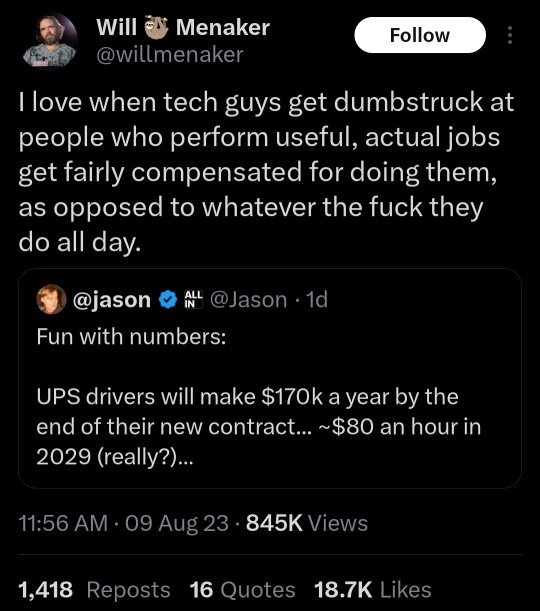
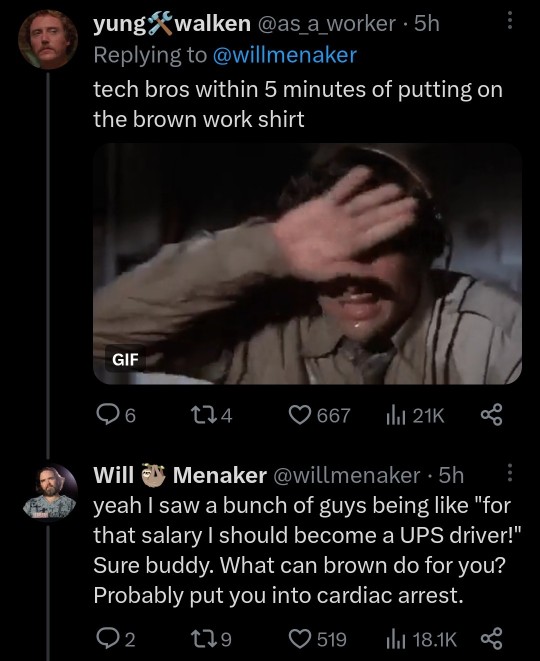
1K notes
·
View notes
Text
On Thursday morning, before my first sip of coffee, the alerts started flooding my phone. My employer, Microsoft, was laying off 1,900 workers and it was all over the news. I work at the video game company ZeniMax, which was acquired in 2021 by Microsoft, so I felt a familiar, sickening feeling start to take hold.
But I can’t say it came as a surprise. So many people in our industry have lost their jobs this way recently. In 2023, at least 6,500 video game workers were laid off (unofficial trackers have that number much higher). And even before this latest round, 2024 hadn’t shown any sign of improvement.
The video game industry is huge. It was bigger than the movie and music industries combined following the 2020 pandemic surge, and while it has dropped a bit since then, it remains a multibillion-dollar industry. However, it’s still relatively young and lacks a history of successful worker organizing.
#news#labor news#gaming news#tech news#tech industry layoffs#gaming industry layoffs#2024 layoffs#zenimax#zenimax union#communications workers of america#cwa
223 notes
·
View notes
Photo
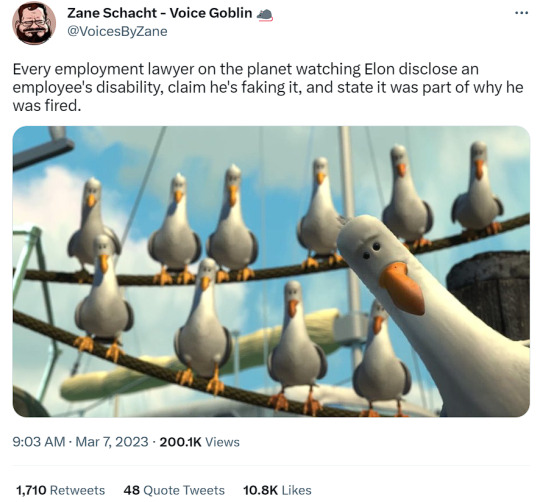
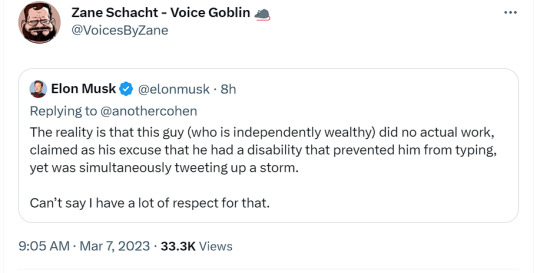
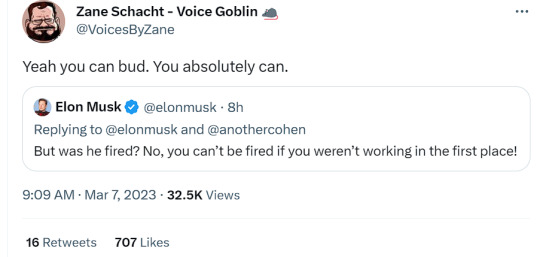
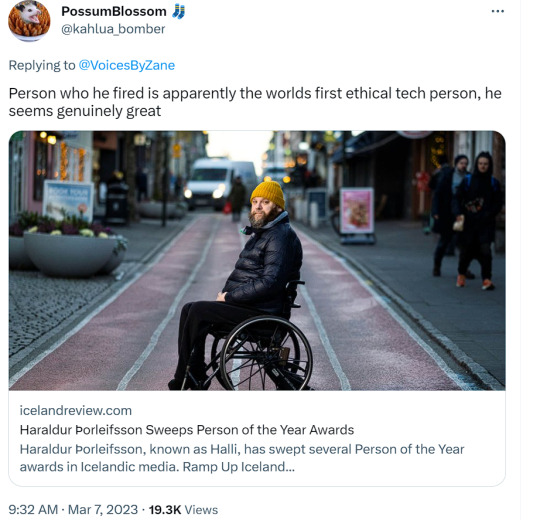
@voicesbyzane
#politics#the left#disability#discrimination#disability rights#elon musk#twitter#tech#silicon valley#employee rights#union rights
1K notes
·
View notes
Text

Testing of the Ural electronic computer produced by the Penza plant "SAM". Photo by Sigismund Kropivnitsky (Penza, USSR, 1957).
164 notes
·
View notes
Text
the fact that AI could potentially replace a lot of art jobs honestly speaks more to how monotonous and dull making commercial art is than how "evil" the technology is. philistine execs and corporations dont care about the rich possibilities of art. it makes sense that artists are easily replaceable to them when all theyre trying to make are products. it feels like more than ever ppl have to wrestle w the fact that most commercial work is garbage fodder for quick money and to think more about what aspects of art are irreplaceable with automation. but living under capitalism goes directly against exploring art in a way that matters bc ppl r too busy trying to survive so here we are
#txt#i have many gripes w the anim industry and the state of this art form#and i really feel for people who lose their jobs bc of this. i hope the unions win. but i also hope people reflect more on#WHY this is happening instead of being reactionary to the tech itself
52 notes
·
View notes
Text
"More than 150 workers whose labor underpins the AI systems of Facebook, TikTok and ChatGPT gathered in Nairobi on Monday [May 1st, 2023] and pledged to establish the first African Content Moderators Union, in a move that could have significant consequences for the businesses of some of the world’s biggest tech companies.
The current and former workers, all employed by third party outsourcing companies, have provided content moderation services for AI tools used by Meta, Bytedance, and OpenAI—the respective owners of Facebook, TikTok and the breakout AI chatbot ChatGPT. Despite the mental toll of the work, which has left many content moderators suffering from PTSD, their jobs are some of the lowest-paid in the global tech industry, with some workers earning as little as $1.50 per hour.
As news of the successful vote to register the union was read out, the packed room of workers at the Mövenpick Hotel in Nairobi burst into cheers and applause, a video from the event seen by TIME shows. Confetti fell onto the stage, and jubilant music began to play as the crowd continued to cheer.
The establishment of the Content Moderators Union is the culmination of a process that began in 2019, when Daniel Motaung, a Facebook content moderator, was fired from his role at the outsourcing company Sama after he attempted to convene a workers’ union called the Alliance. Motaung, whose story was first revealed by TIME, is now suing both Facebook and Sama in a Nairobi court. Motaung traveled from his home in South Africa to attend the Labor Day meeting of more than 150 content moderators in Nairobi, and addressed the group.
“I never thought, when I started the Alliance in 2019, we would be here today—with moderators from every major social media giant forming the first African moderators union,” Motaung said in a statement. “There have never been more of us. Our cause is right, our way is just, and we shall prevail. I couldn’t be more proud of today’s decision to register the Content Moderators Union.”
TIME’s reporting on Motaung “kicked off a wave of legal action and organizing that has culminated in two judgments against Meta and planted the seeds for today’s mass worker summit,” said Foxglove, a non-profit legal NGO that is supporting the cases, in a press release.
Those two judgments against Meta include one from April in which a Kenyan judge ruled Meta could be sued in a Kenyan court—following an argument from the company that, since it did not formally trade in Kenya, it should not be subject to claims under the country’s legal system. Meta is also being sued, separately, in a $2 billion case alleging it has failed to act swiftly enough to remove posts that, the case says, incited deadly violence in Ethiopia...
Workers who helped OpenAI detoxify the breakout AI chatbot ChatGPT were present at the event in Nairobi, and said they would also join the union. TIME was the first to reveal the conditions faced by these workers, many of whom were paid less than $2 per hour to view traumatizing content including descriptions and depictions of child sexual abuse. ...Said Richard Mathenge, a former ChatGPT content moderator... “Our work is just as important and it is also dangerous. We took an historic step today. The way is long but we are determined to fight on so that people are not abused the way we were.”
-via TIME, 5/1/23
[Note: In addition to Big Tech outsourcing and exploiting workers for social media and AI moderation, many companies also exploit and vastly underpay mostly overseas workers to straight up pretend to be AI. I'm really glad issues around this are starting to get attention AND UNIONS because exploited overseas labor is so often the backbone of AI--or even the "AI" itself.]
#labor unions#africa#kenya#south africa#open ai#chatgpt#facebook#meta#tiktok#workers rights#labor rights#exploitation#outsourcing#big tech#anti ai#nairobi#unionisation#unionize#good news#hope
240 notes
·
View notes
Text

#scifi#torment nexus#tech companies#fuck capitalism#capitalism kills#we live in hell#socialism now#abolish capitalism#peoples union
28 notes
·
View notes
Text
"Why are we automating art when we could be automating these MENIAL and DEMEANING jobs instead?"
1) How enjoyable a task is to THE AVERAGE PERSON has zero correlation to how easy it is to automate; we don't HAVE the technology to automate sewer maintenance without flooding the streets with shit
2) There is no work that's inherently menial and demeaning and unenjoyable, nor any such thing as unskilled labor, and in fact if you realized this as much as you say you do when it's not about your fear of art getting cheapened by being available to your ~lessers~ you'd be aware that the skills to work in sanitation in particular - dealing with biohazards - are complicated and hard to learn and deserve respect; safety rules are written in blood (or sometimes in shit)
3) Sure, PARTIAL automation could work wonders for improving safety in some dangerous jobs once ROBOTICS - not just software - advances further, but you do realize that um. The people doing those jobs you're so gung-ho to automate out of existence. Um. Also...need to get paid? To like. Eat? You realize this right? Right???
#ai tag#tech#serious tag#what we need to be doing is working on an automation safety net for the WHOLE FUCKING ECONOMY#automation taxes for companies#beefing up unemployment -> ubi#using unions to enforce realistic expectations and fair treatment for the human role in partially automated work#etc.
60 notes
·
View notes
Text
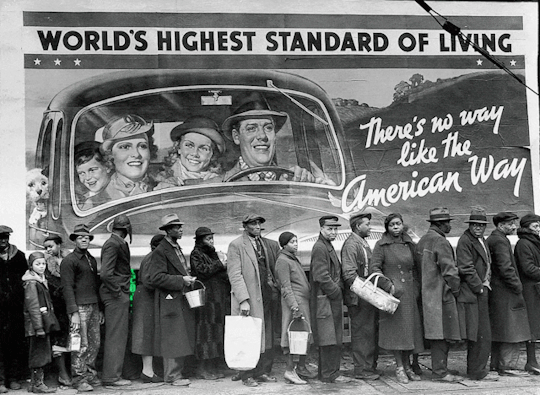
Tech workers spent a whole generation conceiving of themselves as entrepreneurs who bargained, nerd-to-nerd, with other entrepreneurs who needed workers as much as workers needed paychecks.
These workers allowed themselves to be convinced that being “extremely hardcore” — that is, working body- and mind-ruining hours (without overtime pay) was a badge of honor.
They let themselves believe that their bosses gave them gourmet cafeteria food, “on-campus” fitness centers and daycare because they were valued workers — and not because this created the conditions where workers could be induced to put in longer hours without additional pay.
They conceived of themselves as ascetic monks, a priesthood that labored every hour God sent to bring digitization to the world. Meanwhile, their bosses’ wealth soared, even as their own working conditions deteriorated.
Tech workers may be prone to the same rationalization and self-deception as the rest of us, but (like the rest of us), they aren’t fools. Anything that can’t go on forever will eventually stop.
As conditions and prospects worsened, tech workers’ identities as workers emerged from a generation-long coma. They penned manifestos, walked off the job, and formed unions.
-The proletarianization of tech workers: If there is hope, it is in the proles
#eric flint#science fiction#tech workers#labor#unions#there is power in the union#sf#labor organizing#proletarianization
699 notes
·
View notes
Text



#really hoping that this is what pushes retail pharmacists & techs to unionize#the discontentment is there. no one at my workplace is happy with whats going on#screaming nightmare era
72 notes
·
View notes
Video
you ARE a worker
#tiktok#verso books#verso#workers vs capital#workers#workers rights#labor unions#union workers#tech workers#labor vs capital#capital vs labor#labor rights#skilled labor#labor#labor movements#labor movement#factory town#tech
91 notes
·
View notes
Text
There’s one sense in which the bad batch had a little more control over their lives than clones sometimes had. They didn’t have a jedi general, they had their own ship, they were allowed special accommodations like their barracks and their armor, and they were given an enormous amount of leeway in how they fulfilled their missions.
In another sense, though, there’s a way in which they had a lot less. And just to be clear, I’m not trying to make an argument about who had it worse. None of the clones has ever had much agency in their lives. None of them were ever afforded the decency of being considered people. None of them really had the option to do anything but be soldiers conditioned to fight and die for a cause they didn’t choose, not without putting other clones in danger (like Slick) or risking court martial (like Cut). Things are bad for all of them. Mostly I’m looking at how the bad batch’s perception of their own experience could change depending on the angle at which they’re looking at it.
Because yes, they were given more leeway in certain ways, but in that other way? Not only were they not given the choice as to whether or not to be soldiers, they were not given the choice as to what kind of soldiers they wanted to be.
Wrecker, for example, is incredibly smart. Not just in the sense that he’s emotionally intelligent, but he’s also a skilled mechanic, weapons specialist, and demolitions expert. This is a guy who built a handheld laser canon out of scraps while getting shot at, and it took him, what—fifteen seconds? But due to the accident of the way he popped out and the way the Kaminoans took advantage of that, because he’s just so much bigger and stronger than everyone else, he was never given the option to be anything but the designated muscle. I think the weapons and demolitions stuff is something he picked up over time because he likes it, but he didn’t have the option to be the team’s technician the way that Tech is. And Tech—Tech is the second strongest guy on the team. He’s strong, extremely athletic, and he’s got a wild pain tolerance. But because of the accident of how he came out, he was never given the option of becoming the hand-to-hand specialist Hunter is, and certainly not the tank that Wrecker is. (I’m still forming my thoughts on Hunter and Echo, but there’s no way anyone else on the team besides the guy with magnified senses would be allowed to be the team tracker, and Echo’s situation is a little different. And before joining the batch and leaving Kamino, Omega never had any agency in her life at all.)
And then Crosshair. This is something we don’t talk about in the fandom all that much, but Crosshair’s a genius. He’s as stone cold brilliant as anyone else on the team, if not more so, in his own way. The thing that makes him such a good sniper isn’t just that he’s got good eyes and steady hands, it’s also his ability to do the math and calculate angles and timing to an incredible level of precision. And, based on what we see in “Reunion,” “Return to Kamino,” and even “The Solitary Clone,” he’s got a good head for strategy and some decently solid, on the ground, battlefield leadership skills (even if he wasn’t technically in charge during that last one). He could make a decently good field commander. But, again, because of the way he popped out of the tube, he wasn’t given the option to be the analyst guy or the leader, he was the sniper. And that’s it.
Every one of them has the capacity to be good at other things. Every one of them is good at other things. But at the start they roll out like your prototypical late 80’s/early 90’s action cartoon hero team because those are the roles they were forced into since getting decanted. But when they look at their experience as part of the GAR, I think they probably look at the other part of that experience where they were given some leeway that other clones didn’t always have, and it makes it difficult for them to see how completely controlled their lives have always been.
#the bad batch#Hunter bad batch#wrecker bad batch#tech bad batch#crosshair bad batch#echo bad batch#if you squint#I’m still formulating my thoughts on how this worked for him#because on the one hand he chose to join the batch#but on the other hand the need to make that choice was forced on him by the techno union
125 notes
·
View notes
Text
Chinese ppl are also saying that american unions would never let the govt take away their workers holidays... the fact that chinese workers are looking at american unions in envy bc they feel that even AMERICAN unions do more for workers than their unions is soooo depressing like i dont think ppl realize how deeply capitalist china is in everything but name they are just as capitalist as everyone else but with even worse worker protections the function of most chinese unions now is just so they can embezzle money and prevent actual unions from forming bc they can say well you already have one 🤷♀️ its fucked workers of the world are really all in this tgt
#not to mention the professions that dont have unions at all like they are literally working all the tech ppl to death#sidney talks shit
19 notes
·
View notes
Text
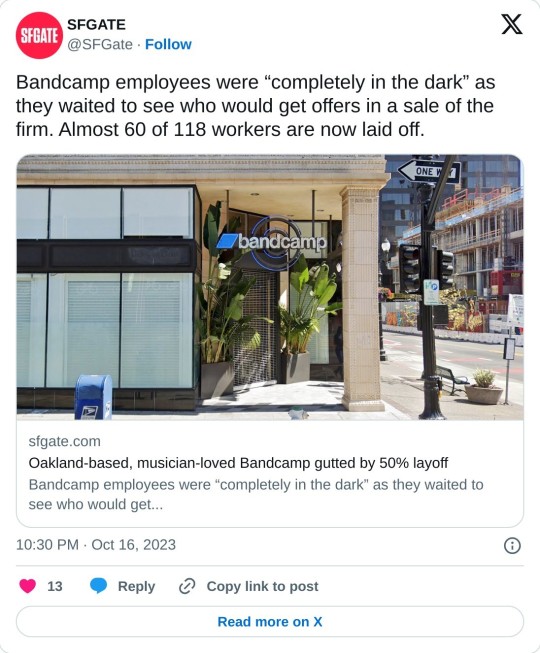
#Bandcamp#Bandcamp Union#Bandcamp Daily#music#music industry#capitalism#corporate greed#union#union workers#layoffs#laid off#writers#tech#edotors#editorial#staff#songtradr#epic games#sfgate#San Francisco#Oakland
20 notes
·
View notes
Text
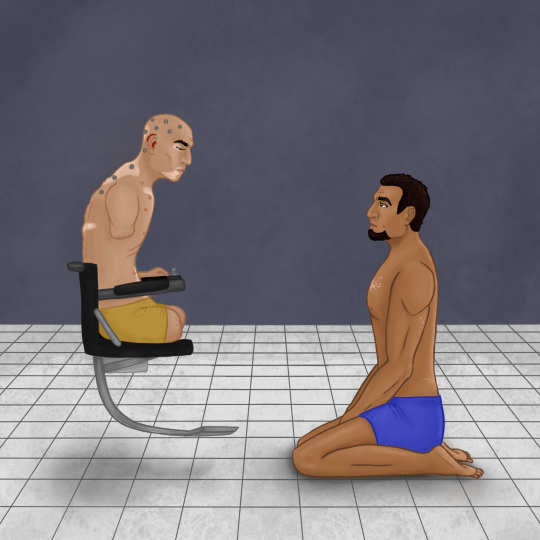
Here's some angst, because sometimes bodies just feel like a mess. plus a bad background xoxo
#NOTES ARE IN THE TAGS LOOK DOWN HERE I was too lazy to put them on the post#cause then I’d have to be coherent and why do that when I could just ramble wordvomit about it instead#ANYWAY... healing isnt linear!#especially since like. lmao he's not done being surgeried xoxo#turns out if a lot of your body is made up of tech. taking said tech out. may shut it down a bit...#anyway so yea that's whats happening.#waking up in the night bc his body is on fire bc sure yeah its healing but theres still screws and bolts in places that hurt.#and he didnt feel so bad before they pulled everything out because things held themselves in place...#but now everything is loose and things need to be replaced ASAP and thats just possible because the body needs time between#exerimental surgeries (who the hell has reversed this bad of techno union augmentation before?)#and...#and sometimes. sometimes fives lives in a world where it feels like he could lose echo again at any moment. and he's so scared#he almost lost everyone and everything and now... he has echo.#he has kix and jesse and tup and dogma... and he has echo.#YEAH okay#And. to make things clear: echo's skin tone IS based off photos of temuera morrison#when he had probably not seen much sun in a while.#AND the white patches are chemical-induced vitiligo (skin pigment cells died)#*BUT*#that being said. i clearly have room to grow in my art and if it's wrong to have portrayed him this way#please let me know.#thanks <3#saleucami au#arc trooper echo#arc trooper fives#star wars: the clone wars#star wars#my art#mimse art
20 notes
·
View notes